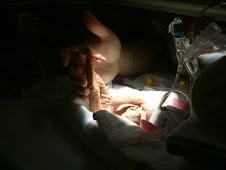We took Truman to an oral-motor specialist yesterday. She and her graduate student spent about three hours with us evaluating Truman's speech and eating. She says he is severely disordered in both speech and feeding, but that he does not have apraxia. She is confident that will the right kinds of therapy and lots of intense work that he will talk and gain full oral function at some point. She made us feel really confident as well that she knew what she was talking about.
She said Truman basically has the oral strength and motor skills of an infant. She said he doesn't eat anything with texture because he literally can't at this point. She pointed out things that we had heard hinted about but never really discussed with his other therapists, like the fact that Truman can't lift his tongue up or back -- making it rather hard to move food or a liquid bolus from a cup to the back of the throat. She also said that he can't move his tongue side-to-side past the inside of his teeth, which means he can't sweep any food out of his jaws. Also, he can't move his teeth side to side, meaning he can only bite, not chew. She not only told us these things, she showed up these things as we went along. The good news, though, is that she believes he can overcome all of this with the right intervention.
As for speech, Truman is also severely disordered in her assessment, but she said he does NOT have apraxia. She pointed out that he does have a number of the symptoms, but that there are some key skills he does not have that an apraxic child would not. For example, he can string two slightly different syllables together in his babbling and he has inflection in his babbling. She felt like he was on the verge of a verbal break-through, but that same lack of oral-motor strength that prevents him from eating prevents him from talking.
The primary thing that we were happy to hear is that she thinks he will talk completely normally at some point. However, she does not believe he will get there on his own. It will take lots of intense therapy and time. The reason we were so concerned about apraxia is that many children with it either never speak or never speak well. Interestly, because he is severely disordered in his speech, even if it's not apraxia, the total communication method is still the appropriate treatment -- so we will continue intense signing. This is because you don't want to let a lag in speech stall his progression in learning language. This is something I was trying to articulate to his speech therapist without knowing how to say it. Speaking of signing, she was fluent in sign language, so for one of the first times ever, we got to see Truman really communicate with someone other than us or other family members learning to sign along with us.
She gave us a short report yesterday and is writing a long report for Truman's regular therapists. She has put him on the waiting list for both an oral-motor feeding program and the oral-motor speech preschool program at UT-Dallas - both of which are group programs he would do in addition to RISD's Preschool Program for Children With Disabilities and his current therapies at Our Children's House.
Perspective is a funny thing because his report looks really bad to person who hasn't been in the trenches with their kid. Phrases like "severely disordered" are scary, but since we were expecting something much worse, we really feel like a huge weight has been lifted our shoulders in knowing that an expert in the field believes Truman WILL talk someday. And one silver lining -- we will also have learned a new language in the process.
Subscribe to:
Post Comments (Atom)


1 comment:
That's great to hear, Kara! He is beating the odds, and will continue to do so! By the way, he is also such a cutie!
Post a Comment